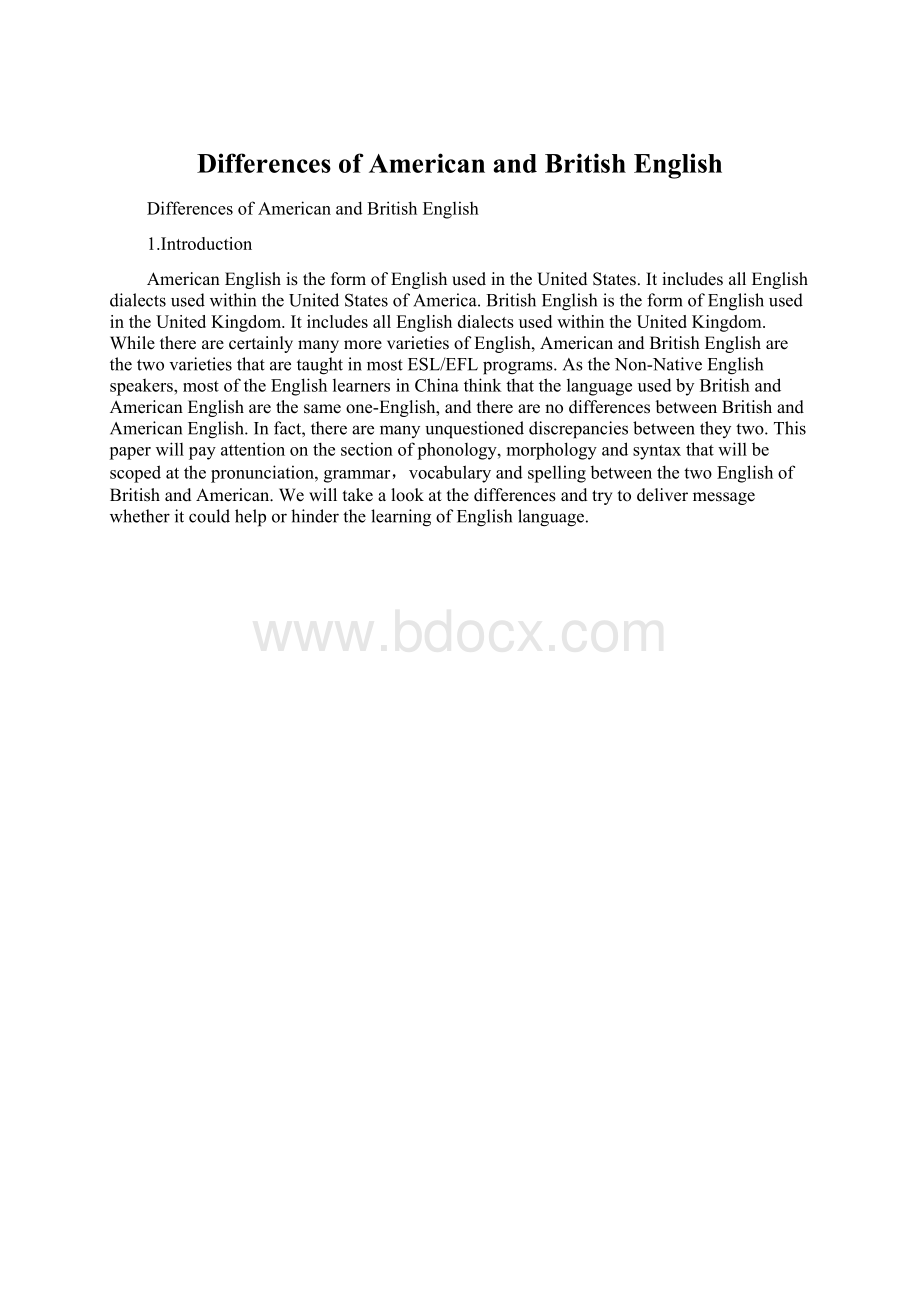Differences of American and British English.docx
《Differences of American and British English.docx》由会员分享,可在线阅读,更多相关《Differences of American and British English.docx(12页珍藏版)》请在冰豆网上搜索。

DifferencesofAmericanandBritishEnglish
DifferencesofAmericanandBritishEnglish
1.Introduction
AmericanEnglishistheformofEnglishusedintheUnitedStates.ItincludesallEnglishdialectsusedwithintheUnitedStatesofAmerica.BritishEnglishistheformofEnglishusedintheUnitedKingdom.ItincludesallEnglishdialectsusedwithintheUnitedKingdom.WhiletherearecertainlymanymorevarietiesofEnglish,AmericanandBritishEnglisharethetwovarietiesthataretaughtinmostESL/EFLprograms.AstheNon-NativeEnglishspeakers,mostoftheEnglishlearnersinChinathinkthatthelanguageusedbyBritishandAmericanEnglisharethesameone-English,andtherearenodifferencesbetweenBritishandAmericanEnglish.Infact,therearemanyunquestioneddiscrepanciesbetweentheytwo.Thispaperwillpayattentiononthesectionofphonology,morphologyandsyntaxthatwillbescopedatthepronunciation,grammar,vocabularyandspellingbetweenthetwoEnglishofBritishandAmerican.WewilltakealookatthedifferencesandtrytodelivermessagewhetheritcouldhelporhinderthelearningofEnglishlanguage.
2.toricalBackground
Basically,BritishEnglishistheformofEnglishusedintheUnitedKingdom.ItincludesallEnglishdialectsusedwithintheUnitedKingdom.AmericanEnglishhasthesameformofEnglishusageasBritishandalldialectsusedwithintheUnitedStatesofAmerica.Ashistory,thefirstEnglishwasfirstintroducedtoAmericasbyBritishColonization,beginningintheearly17thcentury.Bythehistoryoverview,Britainwasagreatcountrythathadenoughpowertomovetheirimperialismonothercountries.AmericaitselfwasacolonizedofBritishandalltheperiodBritishhadplaytheirroleofcolonizationtospreadawaytheirlanguage.Andnow,AmericaisusingEnglishasaresultofBritishtrade,communicationandcolonization.ThespreadingofthelanguagemadeUnitedStatesuseditaswellbuttherearedifferencesoftheusageofthelanguageandfinallyleadingtoanewdialectsandaccent.Consequently,therearetwosupremelylanguageoftheworldthatrenownandusedallovertheworld.ItisAmericanlanguageandBritishlanguage(StandardEnglish).Now,thedifferencesofthetwolanguagesincludepronunciation,grammar,vocabulary(lexis),spelling,punctuation,idioms,formattingofdates,andnumbers.ThistoldusthatthetwolanguagesarefamilybecausetheycamefromthesamerootoflanguageestablishmentfromBritishandtherewasahistoricalbackgroundoftrade,colonizationandgreateffortstoliftupthelanguagetotheentireworld.Theworld-wideexperienceemergedthetwofamiliesofEnglishlanguage,onestemmingfromlinguisticcontactwithBritish,theotherfromcontactwiththeUnitedStates.FromthelinguisticcontactofBritain,itsfamilycouldbefallenintopiecesofWestIndies,BritishIsles,AustralasiaofAustraliaandNewZealand,andAfricaofRhodesiaandSouthAfrica.ThecontactofAmericanEnglishfamilycouldbeseenfromtheUnitedStatesitselfandCanada.Astheexplanationofthefirsthistoricalbackground,wecouldassumetoBritishandAmericanasnationalvarietiesinthescopeoflanguage.Thisisbecausethetwocountriessharedthesamelanguagebuttherebeagreattransformationofthelanguagethatmadethemdifferent.ThesetwovarietiesaretheonesspokenbymostnativespeakersofEnglishandfurthermorestudiedbymostforeignlearners.ThisputuptheinternationallanguageofEnglishcontainaspecialstatusastheprinciplenationalvarietiesofthelanguageofthetwocountries.Furthermore,whatmoredifferenceswouldwefindtostatethattheyareholdingvarietiesofEnglish?
LetmestartedinitiallyfromthedifferencesbetweenthetwoisEnglishspokenindifferentplaces.Moreoveritalsodifferentaccentsthatrefertopronunciationonlyandthelastareaboutdialects.Thetermdialectsrelatestopatternsofgrammarorvocabulary.
2.1AnalysisofDiscussion
InthissectionwewilltakealookatthefourscopesofthestudyofalanguagebetweenBritishandAmerican.Thereareamongpronunciation,grammer,vocabularyandspelling.Now,themostobviousdifferencebetweenBritishandAmericanisinthe“tune”ofthelanguage,thatis,theintonationthataccompaniessentences.ThiscouldbenoticedwhenaBritonoranAmericantalk,theyidentifythemselvesprimarilybythetunesoftheirrespectivevarieties.However,insingingtheprosetuneisoverriddenbythemusicaltune,makingitmuchhardertodistinguishBritishandAmericansingers.MostpeopleorlearnersoflanguagewouldliketodifferthetwoEnglishbythetunetheyproduced.Thisisthebasisoflearnerstobeabletodifferentiateitaswell.ForthenextsubtopicwewilllearnandstudymoreaboutthedifferencesofthetwoEnglishandmakeusclearofthatuniversallanguage.
3.Differences
3.1DifferencesinPronunciation
Pronunciationisonepartofastudyoflanguage.Here,allforeignlearnershavetoknowthreeelementsasapacetogofurtherinEnglish.Thereareacousticphoneticsreferstoastudyofthephysicalcharacteristicsofspeechsound,auditoryphoneticreferstoastudyofperceptionofspeechsounds(howlearnersperceivespeechsounds),andtheoneisarticulatoryphoneticsthatreferstoastudyofhowthevocaltractproducesspeechsounds.
DifferencesinpronunciationbetweenAmericanEnglish(AmE)andBritishEnglish(BrE)canbedividedinto:
3.1.1Pronunciationofvowel
1)Pronunciationofo
InBritain,the“o”vowel,[ɒ],inwordslikedog,hod,pot,ispronouncedwithroundedlipsandthetonguebackinthemouth.Americansdonothavethisvowel,insteadpronouncingthesamewordsusingthe“ah”vowel,[ɑ],withthelipsunroundedandthetonguebackbutmorerelaxed.Thisisthesamevowelincardorbard.InsomecasesintheUSthe“o”ispronouncedusingthe“or”vowelinwordslikelong(CentralEastCoast)andhorrid(especiallyinthewesternUS).
The“plumy”qualityofsomeRPspeakersisprobablyduetoanexaggerationofthis“o”vowel,andothervowels,bypushingthetongueasfarbackaspossible,accomplishedbyspeakingwhilstimaginingamouthfullofplums.
2)The“or”vowel[ɔ](orthe“aw”vowel)
Thisisthevowelinoar,law,Borg,Bork,porkandsoon.IfIwasAmerican,Iwouldhavecalleditthe“aw”vowel,butIthinkAmerican“aw”variesmoreregionally,andEnglish“or”ismoreconsistentlycloserto[ɔ](aslongasyoudon’tpronouncether).
Many“or”wordsinBritainsuchaspaw,saw,talk,all,bought,launch,taught,portarepronouncedinAmericausingthe“ah”vowel,[ɑ].I’veevenheard“awesomepossum”rhymeperfectly[ɑsəmpɑsəm].ButmanywordsinAmericanretainthe“or”vowel,suchaspoor,suchthattheBritishhomophonespoorpawarepronounceddifferentlyinAmerican.IntheCentralUSEastCoastthe“or”voweloccursinmostofthesamewordsasBritish,butitisslightlyshorter,[ɔ]ratherthan[ɔ:
].InAmerican,“dawg”,aswrittenincartoonsandsuch,usesthe“or”vowel,andthespellingemphasizesthepronunciationasunusual.Oddlyenough,quark,correctlypronouncedtorhymewithquartbymostAmericansisoftenpronouncedtorhymewithdarkbymostBritishpeople.
3)Pronunciationofa
TheBritishhavethe“a”vowel,[æ](cat,hat)andthe“ah”vowel[ɑ],asdoAmericans,butoftenindifferentplaces.Trudgillnotesthatwordswith“a”followedby[f][θ][s][nt][ns][ntʃ][nd][mp](laugh,path,grass,plant,dance,branch,demand,sample)have[æ]inAmericanand[ɑ:
]insouthernBritish.NorthernBritishbendsa-sprettyflatingeneralcomparedtoSouthernEnglish,andisgenerallythesameasAmerican,butthereareexceptionslikebanana,can’t,half,wheretheaismorelikeinthesouth.
InBritain,wordslikewhatarepronouncedusingthesamevowel[ɒ]asindog,above,andsoisphoneticallyspelledwotratherthanwat.Perhapsthisiswhybaloney(nonsense)issospelledinAmericandictionaries,butprimarilyasboloneyinsomeBritishones.
ItshouldbenotedthatinAmericathe“ah”vowel(father,bard,calm)isusuallyshorterandsometimessoundsalittleclosertothe“u”vowelincup.Sothelong,firm[ɑ:
]inBritainreallystandsoutinbathanddancewhereAmericanshavetheshort[æ]mentionedabove.EventhissouthernEnglishaccent,withthelong“a”[ɑ:
]inwordslikefatherandbath,isnotconsistent.
3.1.2Proununcationofnon-vowel
1)D-dt-sinAmerican;glottalstopsinBritish
InmanyareastheAmerican“t”,whennottheinitialconsonantinaword,ispronouncedclosertoa“d”,andinsomecasescandisappearaltogether.Thuslatterandbuttersoundsmorelikeladderandbudder,andwordsliketwentyanddentistcansoundliketwennyandDennis.
InBritain,“t”isgenerallypronouncedlikea“t”,butthereareareastheglottalstopisverywellknown.Thisisthesoundinbetweenthetwovowelsinuh-oh,ortheinitialconsonantinhonest.Inthesetwoexamples,andotherslikethem,theglottalstopoccursasmuchinAmericaasinBritain.Buttheglottalstopthatreplacesthe“t”intheCockneyandGlasgowdialectsismuchstronger;imaginebracingforapunchinthebellywhenyoumakethesound.Wordslikebutterbecome[bʌʔə].
2)RhoticrinAmerican,non-rhoticrinBritish
Rhoticspeakerswillpronouncetherinbarn,park,cart,fart,whereasnon-rhoticspeakerswon’t,makingnodistinctionbetweenbarnand(auto)bahn.MostofAmericaisrhotic,withthenotableexceptionoftheBostonareaandNewYorkCity.SEBritainisapparentlythesourceofnon-rhotic.Englandisnon-rhotic,apartfromtheSWandsomeever-diminishingnorthernareas.ScotlandandIrelandarerhotic.InthemovieThePrincessBride,thebishop(Pet